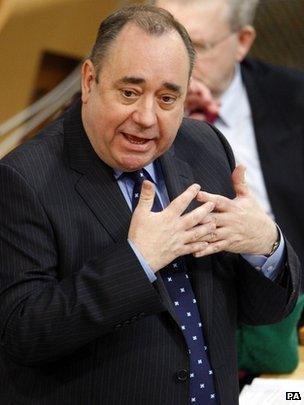The co-operators and the crushers
- Published
As billed on this blog yesterday, there would appear to be at least a degree of internal tension sussurating below the surface of the UK coalition with regard to the proposed independence referendum.

Alex Salmond says he will not accept the UK concept of a referendum "with strings"
Equally, as billed yesterday, I would not seek to over-emphasise this.
At core, both sides deprecate independence and oppose Alex Salmond. The question is how.
To simplify, the default position for most Liberal Democrats is to be emollient, to co-operate with a referendum in the belief that any perceived obstruction would be counter-productive, thereby increasing support for independence.
To simplify still further - and probably too far - the default position for many Tories is that Alex Salmond requires to be reined in, reminded of UK clout.
Hence the somewhat assertive nature of the briefing on Sunday, since discounted, that there would perhaps be an 18-month sunset clause on the offer of a legally binding referendum.
The co-operators and the crushers, then.
As of today, Alex Salmond appears to feel that he can ignore both. But can that position be sustained? Should it?
Again as of today, Mr Salmond seems content that he has successfully depicted the UK initiative as something of a border raid, calculated to interfere malevolently rather than intervene productively.
But, as ever, longer term strategic calculation will be influenced and driven by public opinion. Will Scottish voters see this initiative through the SNP perspective?
Or might they ultimately be cajoled to view it in a different light, as a potential aid to clarity?
The answer to that question may emerge from two consultations.
In the Commons this afternoon, the Scottish Secretary Michael Moore will announce his plans to consult on the notion of giving the referendum the legal authority which they feel it lacks.
He will say the legal problem arises for both a binding and a consultative referendum on the grounds that the UK constitution and any matters related to it are explicitly reserved to Westminster in Schedule Five of the Scotland Act 1998.
That would leave any Holyrood-run referendum open to legal challenge, either in advance or after voters have made their choice.
The Scottish Secretary will express support for an early referendum - but without specifying a precise timetable.
The offer of a legal guarantee will come as a package, with strings: that there should be but a single question on independence; that the ballot should be conducted by the Electoral Commission; and that it should involve the current electorate with no extension, as the SNP favour, to those aged 16 and 17.
Almost simultaneously, the Scottish Cabinet will be meeting to finalise plans for a consultation paper on their own referendum plans. (They have been working on this document for some time: it has not been dreamed up purely for today.)
Scottish government ministers do not accept there is a legal issue with their referendum.
They insist they are entitled to ask voters, on a consultative non-binding basis, to give them the mandate to open independence negotiations.
So what will they ask?
They will ask about a possible second question on devo-max. Or other questions.
They will ask about the franchise. They will ask about the governance of the referendum: Electoral Commission, a distinct Scottish Commission?
And they will ask about timing.
Although it will ultimately be difficult to be precise, the referendum process will be driven by an assessment of what is regarded by the voting public as fair and decisive.
If either side is seen to be manipulating the process to their own ends (or doing so too obviously, since partisan considerations are impossible to exclude), then the public will not be content and the result, arguably, might be invalid or, at the very least, open to challenge.
We need, in short, a process which is generally accepted as fair and capable of producing a verifiably authentic result.
This is not in any way a simple matter. It seems likely to me that Alex Salmond will get his way on timing.
He promised during the election campaign that the poll would not be prior to 2014.

The SNP wants to give Scots their say on independence in the current parliamentary term
Yes, yes, it was on the hustings and not in the manifesto. But the promise was made - and it might, arguably, be seen as an unacceptable intervention by the UK Government to oblige him to break that promise.
And for what, in any case? For a year earlier? In a decision which will affect a 300-year-old Union - and the centuries old nation of Scotland?
On the other side, will the Scottish government persist in its view that the ballot should be run by a distinct Scottish commission instead of the existing Electoral Commission?
That might be a pending concession, as might the demand for 16 and 17-year-olds to be included in the franchise.
The core issue, of course, is the question or questions. Should there be a second question, perhaps on devo-max, involving full control of tax and spending with issues like defence and foreign affairs shared across the UK?
Mr Salmond says he is not directly advocating such a question - although he would not be averse, should it emerge from others.
Strategically, he likes the idea because it might divide the unionist camp and give him a fall-back, should independence fail to find favour.
As billed here previously, the Liberal Democrats might have been intellectually tempted by such a notion - but have decided instead that there should be a straight fight now on independence, while Sir Menzies Campbell investigates devo-max and other matters on their behalf.
Emerging Labour opinion, Douglas Alexander et al, is heading in broadly the same direction: the notion of a parallel process. Although, with Labour, the devo may be less max.
Tory opinion would definitely have headed in that direction, had Murdo Fraser won the Scottish Conservative leadership.
Not so under Ruth Davidson who, partly to counter Mr Fraser, is on record as supporting the Scotland Bill and no further.
So will anyone with sufficient standing advocate a devo-max question - or might the Scottish government devise one with think tank support? Possibly although not, at the moment, certainly.
Which brings us to the question on independence.
There is much talk of a "simple, straightforward Yes or No" in this field. Of course, the debate over wording is anything but simple and straightforward.
Try this for example. The following is open to a Yes or No answer.

Scottish Secretary Michael Moore is outlining his thinking to the UK parliament
"Do you think that Scotland is the equal of other small nations? Do you think consequently that Scotland should be independent and free from obstructive London rule?"
Or how about this one?
"Do you think that Scotland should be impoverished by ending the successful, 300-year-old Union with England and breaking up the United Kingdom?"
Both, of course, contain, deliberately, value-laden propositions. Few would think that either question is completely fair. But how to reach a genuinely fair wording, free from bias?
Further, who decides, ultimately, upon the wording?
The Scottish government, following consultation? Or, as Mr Moore will suggest, the Scottish government seeking ratification from the Electoral Commission?
Further still, even if there is a value-free yes/no question to be drafted, which comes first? Independence or the Union? Which gets positive status and which negative?
Would voters be asked to say "Yes" to the Union (as unionists would want) or "Yes" to independence (as nationalists would argue.)
These questions - not timing, not franchise, not governance - are at the real heart of this debate.